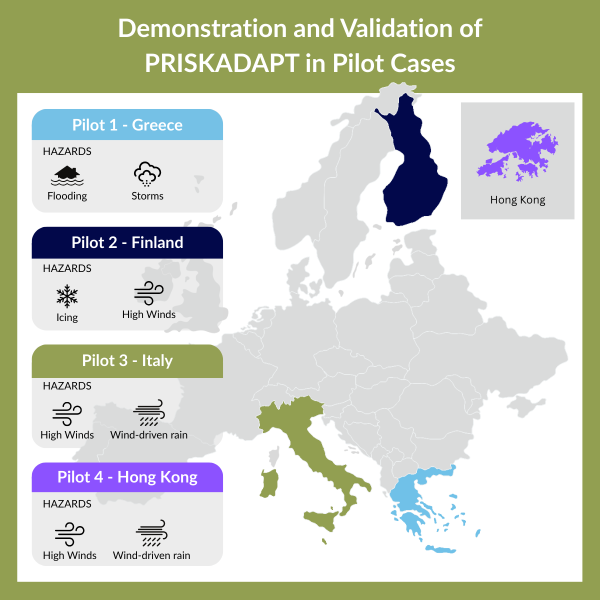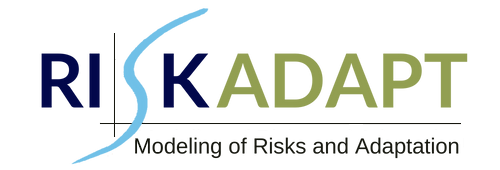Work Package 6
Work Package Name: Demonstration and Validation Activities in Pilot Cases; Third Party Use of TPRISKADAPT/MIS
Lead Beneficiary: UOB

In WP6, the RISKADAPT project is putting its platform PRISKADAPT to the test in real-life situations. This means working with different types of infrastructure like:
- A road bridge in Greece
- Energy grids in Finland
- A hospital in Italy and
- High-rise buildings in Hong Kong
to see how well the tool helps people understand and prepare for climate risks. Local engineers, scientists, and community representatives take part in workshops where they learn how to use the platform, try it out themselves and share feedback. This feedback is then used to improve the system, making it easier to use and more relevant to real needs. The goal is to create a powerful and user-friendly decision-support tool that can be used across Europe and beyond to protect communities and critical infrastructure from climate change.
Deliverables
This document, Deliverable 6.3 (D6.3), presents the outcomes of Task 6.1.1 (T6.1.1) within the RISKADAPT project. The primary goal of this task is to evaluate the PRISKADAPT/MIS platform during its demonstration at Pilot 1, focusing on a Road Bridge in Greece. The overarching objective is to assess the technical performance, operational feasibility, and potential for adoption of the platform among end users and stakeholders, while also gathering feedback to inform future enhancements. As part of T6.1.1, a workshop and demonstration event was organized (on February 13th, 2025) to present the current status of the platform for Pilot 1 and initiate the evaluation process. The methodology followed is in line with ISO 22398:2013 guidelines for exercises and testing, ensuring a systematic approach to planning, conducting, and improving the activities. Through iterative cycles of feedback, the platform is expected to evolve into a tool that meets the dynamic needs of engineers and scientists beyond the project consortium.
The workshop included a presentation of the technical analysis conducted in Pilot 1 and its implementation within the platform. The demonstration session involved a detailed description and training on the platform, followed by a hands-on session, where all attendees had the opportunity to use the platform under the guidance of the training team. At the end of the event, the evaluation process conducted through a technical questionnaire. The platform is accessible online, allowing all project partners and users from the Region of Western Macedonia (RWM) to continue testing and evaluating it.
The results of the questionnaire demonstrated overall positive feedback from participants. Most attendees found the workshop, training activities, and provided materials to be clear and relevant. The majority were able to achieve the specified goals across the various modules with minimal errors and reported that the system was generally easy to use. However, a smaller percentage experienced difficulties, particularly with navigating the map and exploring assets. While many participants believed the platform could enhance task efficiency, some suggested improvements to better meet their expectations. Key recommendations for future enhancements included resolving login and font formatting issues, refining 3D modelling and mapping features, and providing more information on climatological models. Additionally, some participants requested further explanations of graphs and data, easier uploading of multiple infrastructures, and more comprehensive datasets to support expert analysis and 3D representation.
D6.3 represents the first evaluation of the PRISKADAPT platform and contributes to the achievements of the RISKADAPT project by initiating the iterative testing and feedback process. This process will enhance the platform’s robustness and relevance. Specifically, the demonstration activities and evaluation feedback provide valuable recommendations to ensure the platform aligns with the
practical needs of end-users, including stakeholders from Pilot 1, engineers, policymakers, and researchers involved in environmental management, climate risk adaptation, and data-driven decision-making. These improvements will support the development of more effective resilience strategies for critical infrastructures.
Deliverable 6.4 (D6.4) outlines the outcomes of Task 6.1.2 (T6.1.2) within the RISKADAPT project. The task focuses on evaluating the PRISKADAPT/MIS platform during its second demonstration at Pilot 2, focusing on energy transmission grid in Finland. The primary objective is to assess the platform’s technical performance, operational feasibility, and potential for adoption by end-users and stakeholders. Additionally, it aims to collect feedback to guide future platform improvements.
As part of T6.1.2, a workshop and a demonstration event were held on March 31st, 2025, to present the current status of the platform for Pilot 2 and gather input from participants. The methodology applied for these activities adheres to the ISO 22398:2013 standard for exercises and testing, ensuring a structured and iterative approach to planning, execution, and enhancement. The workshop featured a presentation of the technical analysis carried out in Pilot 2, alongside its integration into the platform.
A demonstration session included an overview and training segment, followed by a hands-on component where participants engaged directly with the platform, supported by a dedicated training team. An evaluation was conducted at the end of the session using a structured technical questionnaire. The platform remains accessible online, allowing continued testing and feedback from project partners and users.
Feedback from the technical questionnaire was largely positive. Most participants expressed high satisfaction with the clarity, relevance, and interactive nature of the workshop, training sessions, and supporting materials, reflecting a notable improvement from the earlier pilot. The majority effectively navigated the RISKADAPT platform’s modules, indicating a clear increase in overall usability, especially in map navigation and asset exploration functionalities, areas that previously presented challenges.
Nonetheless, certain modules, notably social parameters and asset initialization, were less intuitive, suggesting targeted refinement is necessary. Participants appreciated the system’s hands-on aspects, specifically highlighting the effectiveness of tower risk analysis and the platform’s interactive capabilities. While overall ease of use was confirmed, minor usability issues such as error recovery and retrieving specific information were noted. No significant new features were proposed by users, with some explicitly stating satisfaction with the current system state.
Innovation potential feedback indicated medium to high satisfaction regarding RISKADAPT’s unique technological offerings compared to existing solutions, highlighting significant potential for wider adoption. However, feedback on marketability was mixed, reflecting cautious optimism about the platform’s disruptive potential. Key innovative features praised by participants included the integrated risk assessment, scenario development, and asset initialization capabilities, coupled with recommendations for enhanced data export functions and expanded climatological modules.
Feedback on social impacts from disturbances in energy infrastructure varied, generally indicating moderate to high perceived impacts. Participants noted significant effects on themselves, their families, and the local community.
Overall, the feedback identifies specific areas for incremental improvement, emphasizing user-friendliness and targeted enhancements to ensure broader applicability and increased market potential of the RISKADAPT solutions.
As the second formal evaluation of the PRISKADAPT, D6.4 contributes significantly to the iterative development process of the RISKADAPT project. Insights gained from the demonstration and feedback exercises are instrumental in ensuring the platform evolves to meet the practical demands of end users, ranging from stakeholders in Pilot 2 to engineers, policymakers, and researchers involved in climate risk adaptation and infrastructure resilience. These enhancements will support the creation of more effective strategies for managing and adapting critical infrastructure to environmental and climate-related challenges.
Deliverable 6.5 (D6.5) presents the outcomes of Task 6.1.3 (T6.1.3) and Task 6.1.4 (T6.1.4) under the RISKADAPT project. The tasks focus on evaluating the PRISKADAPT/MIS platform at Pilots 3 & 4, which involves a tall hospital building in Italy (Pilot 3) and three high-rise buildings in Hong Kong (Pilot 4) that are both exposed to high wind. The main goal is to assess the platform’s technical performance, operational feasibility, and potential for adoption by end users and stakeholders, while also gathering feedback to support future enhancements to the platform. Although Pilot 4 was not originally within the contractual scope of this deliverable, it was included to broaden the evaluation and demonstrate the platform’s applicability to different high-wind hazard environments.
A hybrid workshop and demonstration event took place on July 8th, 2025 in Trieste, Italy. This was the third in a series of events organised under WP6 (“Demonstration and Validation Activities in Pilot Cases; Third Party Use of the TPRISKADAPT/MIS”). The event aimed to showcase the current status of the platform at Pilots 3 & 4 and to collect feedback from participants. The methodology used for these activities follows the ISO 22398:2013 standard for exercises and testing, ensuring a structured and iterative process for planning, execution, and improvement. This is the same methodology applied in the previous events and described in detail in Deliverable 6.3 (D6.3). The workshop featured a presentation of the technical analysis conducted for Pilots 3 & 4 and their integration into the platform.
A demonstration session included an overview and training section, followed by a hands-on session where participants engaged directly with the platform, supported by a dedicated training team. To conclude the session, participants completed structured evaluation questionnaires to provide feedback. The platform remains available online, enabling ongoing testing and feedback.
The analysis of Pilots 3 & 4 demonstration and RISKADAPT technical feedback reveals an overall positive user experience, with participants finding the workshop activities clear, relevant, and well-delivered. Users generally understood how to navigate and operate the platform’s various modules, especially those related to asset mapping and climatological data, though some challenges were noted in areas like social impact modelling and scenario building. While system efficiency was rated as moderate to high, certain tasks, particularly those involving complex data layers, required greater effort, highlighting opportunities for interface streamlining. User satisfaction was strong, especially in ease of use and comfort, though there is room to improve error recovery and information accessibility.
Rich suggestions for improvement emphasised the need for a more intuitive design, transparent data sources, enhanced interactivity, and advanced features such as AI support. These underscore a user base eager to see the platform evolve into a more powerful, accessible, and context-aware decision-support tool.
Innovation potential feedback indicated a strong level of satisfaction regarding RISKADAPT’s unique technological offerings compared to existing solutions, highlighting significant potential for wider adoption. Although feedback on marketability was mixed, most of the responses reflected cautious optimism about the platform’s disruptive potential. Key innovative features praised by participants included the integrated risk assessment, data integration, and asset initialisation capabilities, coupled with suggestions for an enhanced multidisciplinary approach and expanded climatological modules.
Two questionnaires have been shared on social impact and citizens’ perceptions of climate risks impacting their life, and their findings show that respondents are aware of climate change and the risks of an extreme weather event, as well as the consequences and what it means for themselves and
the community. The findings also demonstrate the information needs and how they will be informed after a heavy weather event that will damage buildings and infrastructure.
Overall, the evaluation confirmed that the PRISKADAPT/MIS platform is progressing toward becoming a robust, user-friendly decision-support tool for climate risk adaptation and infrastructure resilience. The feedback gathered during Pilots 3 and 4 will directly inform the final version of the platform, ensuring that it reflects the needs of engineers, policymakers, stakeholders, and the wider community.
